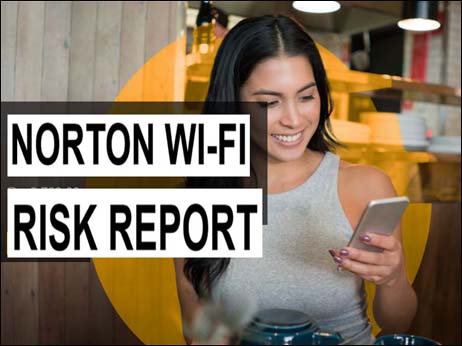
Norton survey reveals, they take incredible risk with personal data when offered a free public hotspot
Bangalore, July 19 2017: Indians like things that are free and will do anything to get them They take incredible risks when using public WiFi networks, sacrificing security when faced with a free connection to the Internet.
A recent survey by Net security specialists Norton reveals that 74 percent believe their personal information is safe when using public Wi-Fi and more than half (57 percent) act unsafely when online.
They don't use a Virtual Private Network (VPN) to secure their Wi-Fi connections, even though this is widely available for free and is known to be the best way for protecting personal information. And some 8% percent are unaware of the term, VPN.
If promised a strong and free WiFi, Indian have shown themselves ready in exchange, to watch a three-minute advertisement (35 percent), allow access to personal emails (19 percent), or personal photographs (22 percent, share contact lists (19 percent) and even give permission to access and even edit personal social media profiles (19 percent). ncredible? 'We are like that only'!
These numbers flow from the 2017 Norton Wi-Fi Risk Report released by Norton , a Symantec brand. The Report is based on surveys of more than 15,000 consumers in 15 countries to learn about their public Wi-Fi practices and perceptions.
Says Ritesh Chopra, Country Manager, Consumer Business Unit, Symantec: “There is a deep divide between what people think is safe when it comes to using public Wi-Fi -- and the reality. What someone thinks are private on their personal device can easily be accessed by cybercriminals through unsecure Wi-Fi Networks or even apps with privacy vulnerabilities.”
Some more India-specific highlights, which highlight questionable behavior on Wi-Fi:
Some 31 percent Indians admit to viewing nude, explicit or suggestive content on public Wi-Fi. Of those people, 44 percent admit to doing so at work and 49 percent have done so in a hotel, hostel or Airbnb-type accomodation.
Almost half (48 percent) of the users have accessed Wi-Fi without the Wi-Fi network owner’s permission; 18 percent guessed or hacked the password to get in.
And most worrying: 96 percent of Indians have potentially put personal information at risk while using public Wi-Fi, including checking their bank accounts, and sharing personal photos and videos.
That Indians are unable to resist access to a strong, free Wi-Fi network despite the risks is especially true while traveling. Access to a strong Wi-Fi network is a deciding factor when choosing a hotel (82 percent), transport hub (67 percent), which airline to fly (64 percent) or place to eat (62 percent).
Norton suggests that how consumers can protect their information online:
- One of the best ways to protect your information online is to use a Virtual Private Network. VPNs provide a “secure tunnel” that encrypts data being sent and received between your device and the internet.
- Look for HTTPS: Many companies use secure websites — HTTPS (Hypertext Transfer Protocol Secure) — to provide online security. You can tell if a website is secure if it has “https” in its URL and has a small lock symbol next to it. But remember, even if the website itself is safe, your personal information could be vulnerable if your network connection isn’t secure.
- Think twice before entering any type of personal information – from passwords, to financial details and photos – over public Wi-Fi networks. Even if you’re not actively sharing the information, your device may be doing so for you. Many devices are programmed to automatically seek connections to other devices on the same network. Remember to disable sharing on your devices to ensure what’s yours stays yours.